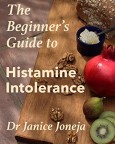Title

The Beginner's Guide to Histamine Intolerance
Author
Janice Vickerstaff Joneja, Ph.D.
Publisher
Berrydales Books
Date
May 2017
If you’re struggling with your health, but the doctor can’t find anything actually wrong with you, then perhaps you have Histamine Intolerance. It’s a condition with a range of unpleasant symptoms, which can include headaches, flushing, itching, hives, swollen facial tissues, racing heart, digestive problems, irritability and more.
Many doctors don’t know much about Histamine Intolerance, although it’s estimated that 1% of the world’s population suffers from it. If you’re one of them, you’ll know first-hand how distressing and frustrating the disorder can be.
Dr Janice Vickerstaff Joneja saw the misery that this condition caused sufferers, and made it the focus of her research work; she’s been studying the condition and helping patients since the 1990s.
She’s now created this easy-to-read guide—which will help you understand if you have Histamine Intolerance, and what you can do about it—with clear advice and explanations, lots of interesting real-life cases, plus diet and treatment recommendations.
If you wonder if your symptoms could be caused by Histamine Intolerance—or if you believe they are and want to know what to do about it—this book is for you.
Table of Contents:
Introduction
How to Use This Book
PART I: What is Histamine and Histamine Intolerance?
Symptoms of Histamine Excess
Why Does Too Much Histamine Cause a Problem?
How Does the Body Usually get Rid of Histamine?
Where is Histamine Found in the Body?
Why do Histamine Levels Increase?
How Much Histamine is Too Much?
How is Histamine Intolerance Diagnosed?
How can you distinguish between Histamine Intolerance and Food Allergy?
Where Does Histamine Come from in Food?
PART II: Managing Histamine Intolerance
Is There a Cure for This Illness or is it for Life?
How can Diet Help in Reducing Excess Histamine?
The Role of Supplements, Probiotics and Antihistamines in Treating Histamine Intolerance
The Histamine-Restricted Diet: Foods to Eat, Foods to Avoid
PART III: Other Conditions and Related Information
Mastocytosis/Mast Cell Activation Disorder (MCADs)
Diabetes
Digestive Tract Issues, Diarrhea and IBS
PART IV: Case Studies
Anaphylaxis
Angioedema (“Swelling Under the Skin”) and Urticaria (“Hives”) After Food Poisoning
Anxiety
Dust Mite Allergy and Grief
Facial Rash, Low Energy, Burning Eyes, Anxiety Attacks, Hair Loss, Weight Loss and Poor Sleep
Fatigue
Hormone Fluctuations, Periods and Ovulation (“Time of the Month”)
Idiopathic Anaphylaxis (“Unknown Allergy”)
Interstitial Cystitis and Mast Cells
Pregnancy
Puberty, Headaches and Urticaria (“Hives”)
Sexual issues: semen allergy and vaginal irritation
Urticaria (“Hives”), Stress and Depression
PART V:
About Dr. Janice Vickerstaff Joneja, Ph.D
Further Resources
Notes